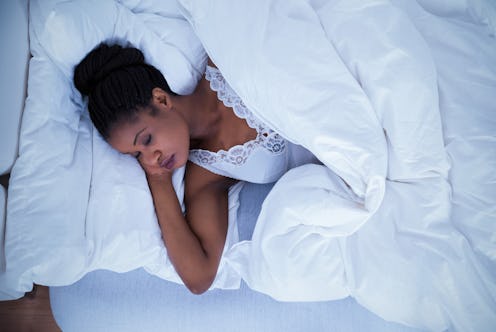Life
7 Ways To Stay Up Past Midnight If You’re An Early Bird, According To Experts

While we all try to get the right amount of sleep, there are some nights where you need to stay up past midnight for a good reason. Whether it's a work event, a wedding, an overnight flight, a seriously good party you just can't miss, or something else, staying awake late occasionally can have its benefits — but if you struggle to stay awake past your bedtime, keeping your eyes open can be difficult. Experts tell Bustle that there are tips and tricks to use, both on the days before your late night and on the night itself, that can keep you alert, engaged and the life of the party without impacting your sleep cycle later.
While an occasional late night won't hurt, staying up late and getting up early often isn't great for you. "Adults should get, on average, seven to nine hours of sleep," certified sleep consultant Julia Walsh tells Bustle. If you're cutting into that ratio regularly, you may find that you experience cognitive difficulties in the daytime, including trouble focusing, memory issues and decision-making. However, with sufficient preparation, sleepyheads with regular bedtimes can make an occasional late night work — without needing a nap in the bathroom at 1 a.m.
1Prepare By Being Well-Rested
If you know you're going to be having a late night, Walsh tells Bustle, it's a good idea to make preparations. "Make sure you are well-rested before," she says. "Go to bed at the same time each night and wake up at the same time each morning. If you are well-rested and get enough sleep on a regular basis, then staying up late one night will affect your body less than if you are overtired." For at least two days before the event, stick to your regular routine and try to get your usual, restful amount of sleep.
2Nap Strategically
Most of us have been told that napping close to bedtime will keep us awake — so on the day of the event, behavioral scientist Dr. Josh Klapow tells Bustle, it's a good idea to use that to your advantage. "If you can get one to two hours of a nap in the early evening, you will shift your normal sleep-wake signals slightly allowing you to stay up later," he says.
3Don't Do Anything That Reminds You Of Sleep
If you're holding the event itself in your home, or staying at home till everybody meets up at 11 p.m., you may need to be strategic about keeping yourself awake and not inducing sleepiness. Dr. Klapow suggests staying away from your normal sleep cues and nighttime routine. "If you normally sit in one room to watch TV before bed, sit in a different room," he says. "Anything that you can do that is different from your normal night time routine will help prevent your sleep cycle from kicking in." If you start doing your regular activities, you may discover sleepiness overtaking you.
4Stay Engaged & Active
If you're struggling to stay alert at a party or social engagement, you may need to get out and start talking, or do something that necessitates brain activity. "Engage your mind in something that requires action on your part, but is a balance between engagement and over taxing," Dr. Klapow suggests. "You want to keep your brain 'on' but you don’t want to overload your brain, which can make you tired. Doing a work project, playing a board game, or interacting with others will keep you stimulated."
As for watching television or scrolling through social media, you may believe that might help, and you'd be partially right, according to Walsh. "The blue light tricks your brain into thinking it is still daytime, which makes it harder to fall asleep," she tells Bustle. However, the activity itself isn't sufficiently engaging to keep you awake when you really want to fall asleep; you're going to need to keep active.
5Stay In Your Daytime Clothing
Dressing up can have an advantage — it tells your brain you're staying awake, says Dr. Klapow. "If you get into comfortable, winding-down clothes, you send signals to the brain that sleep is near," he says. "Stay dressed with shoes on if at all possible to send cues to your mind that sleep time is not near." If you need encouragement to change clothes into something fancy before your event, this is it: it'll keep you psychologically present in an awake state.
6Avoid Feeling Sluggish With Fresh Air & Food
Use your fuel and environment wisely to keep yourself awake. Dr. Klapow suggests staying away from heavy carbohydrates or big servings at dinner to prevent sleepiness, and eating sources of natural sugars that will boost energy, like fruits or vegetables, rather than relying on energy drinks to keep you awake. If you need to stay awake in a hot environment, he recommends taking a break. "Walk outside, walk around, and get your heart rate and core body temperature elevated." Alcohol will also likely not help, as it's a depressant and may simply make you sleepier, so consider staying sober for the evening.
7Recover Properly After Staying Up Late
You've survived the night out and managed to have a good time, and now you need to recover. "Go to bed early the next couple of nights to help your body catch up on missed sleep," says Walsh. However, she doesn't recommend stopping the alarm clock or ignoring it entirely. "Sleeping in does not restore your body in the same way, so hitting the sack early for the next few nights is more helpful for your body."
8
A few helpful tricks can help you get through a late night without too much difficulty. That way you'll be fully rested and recovered within a few nights — and ready to do it all again if necessary.